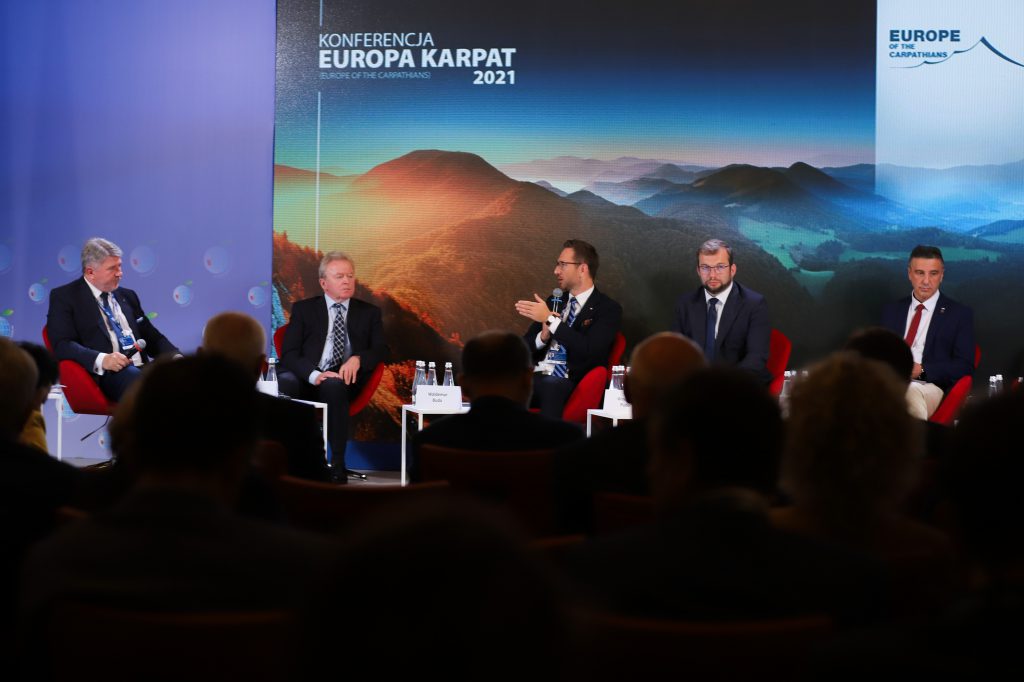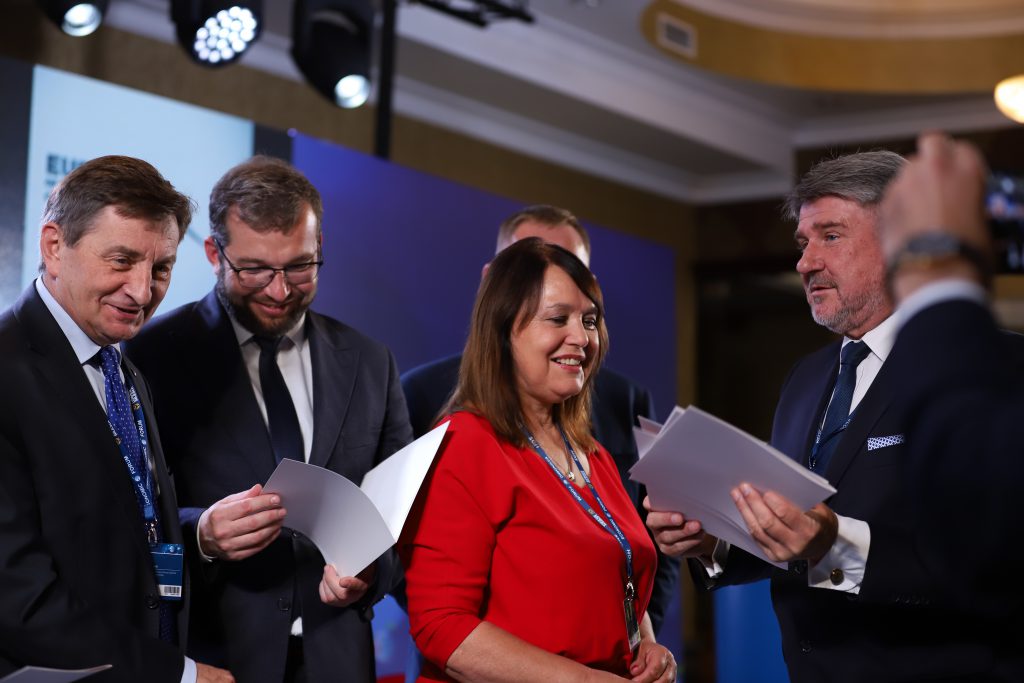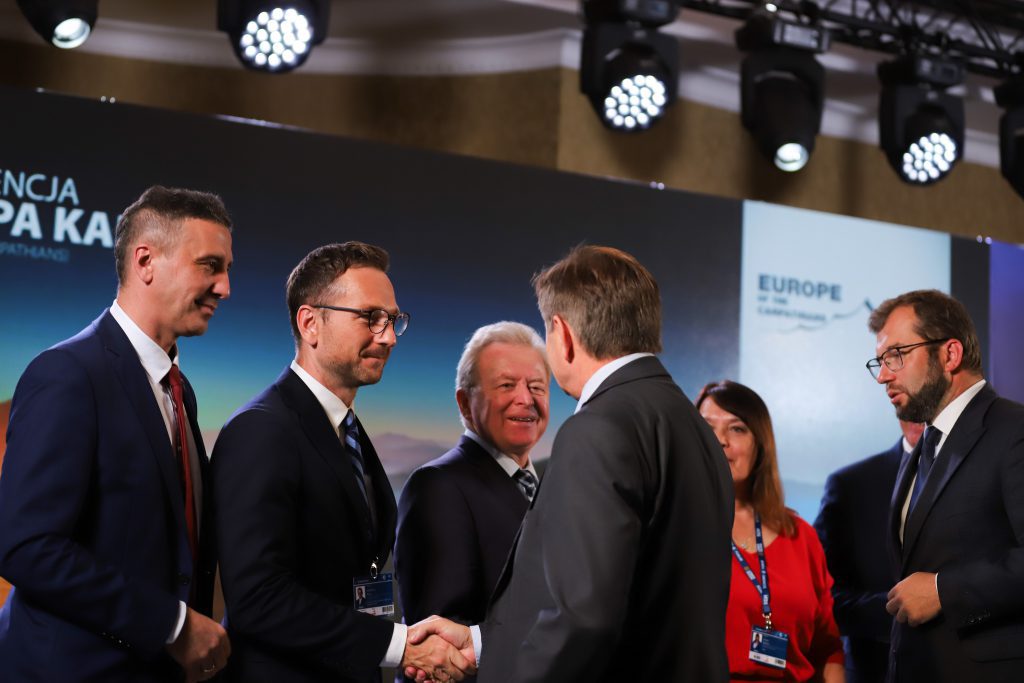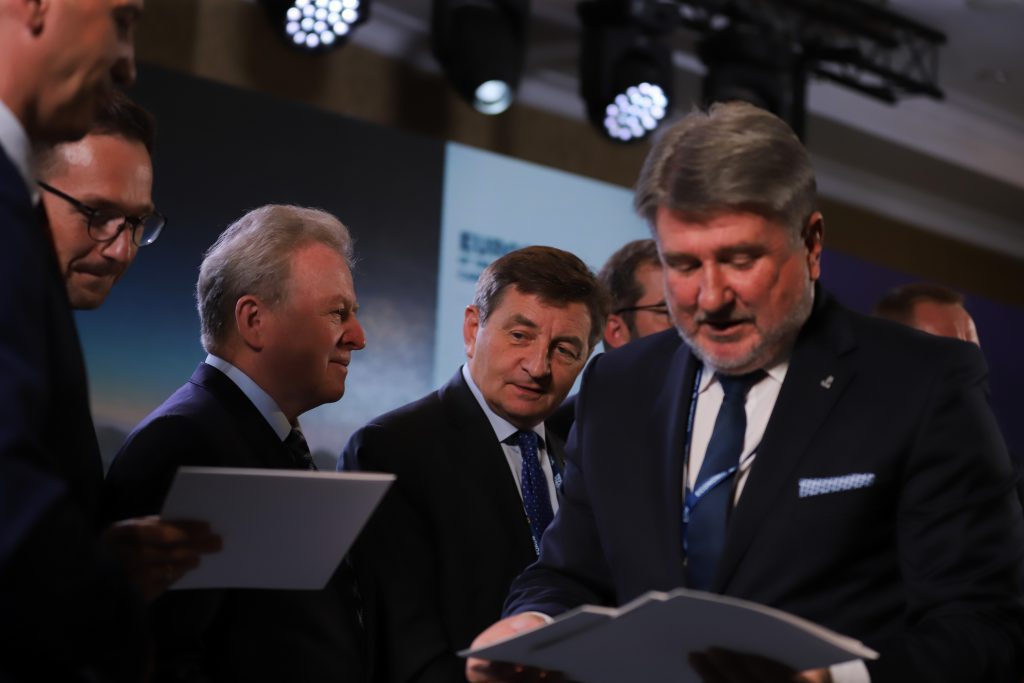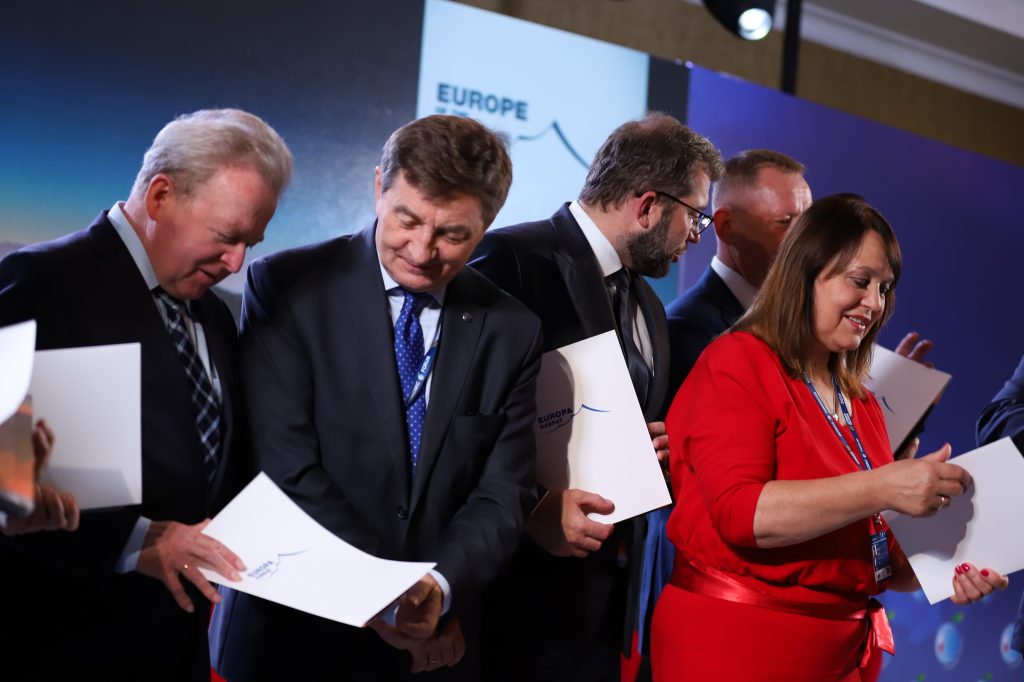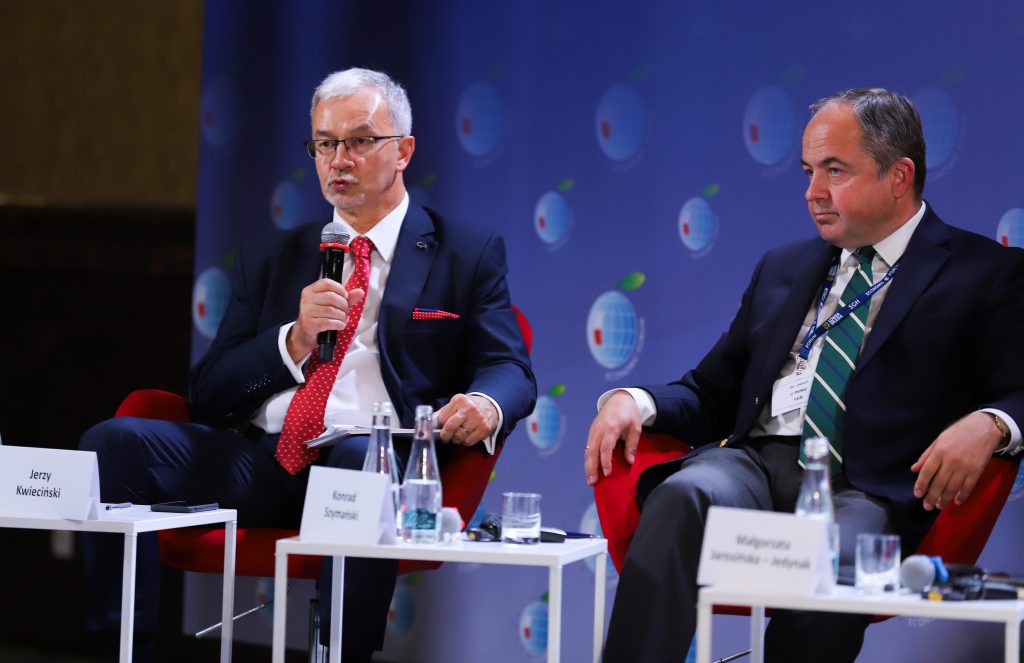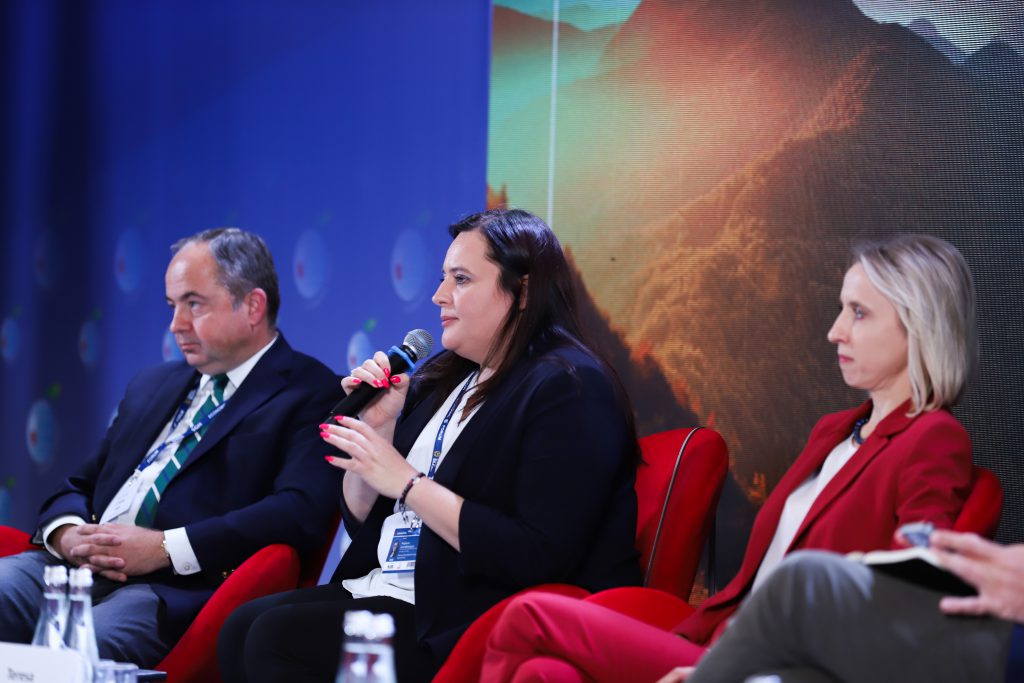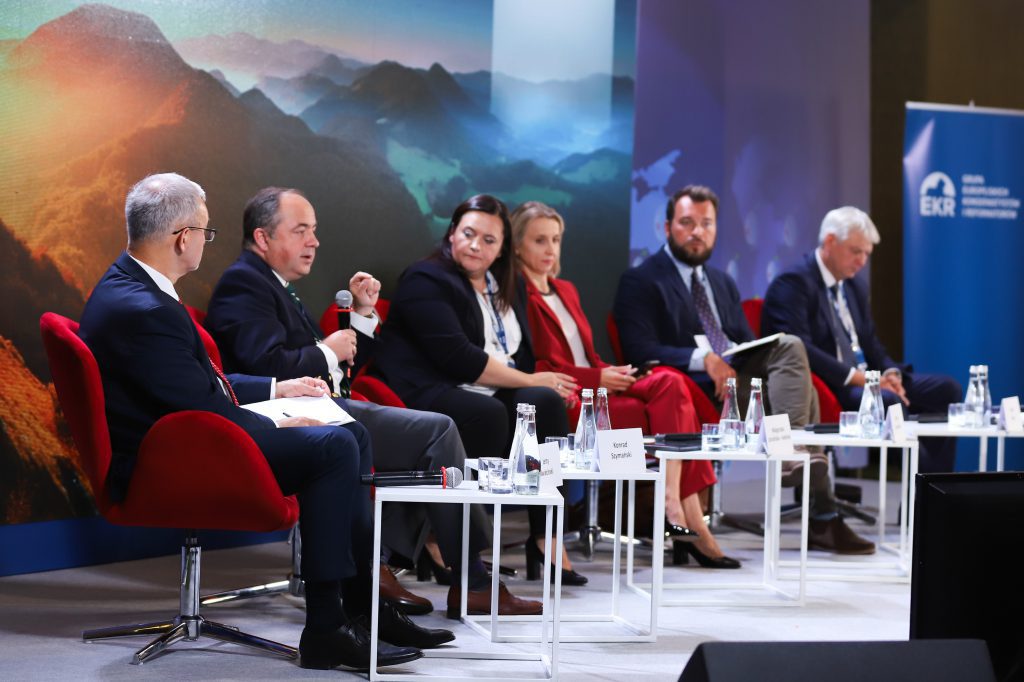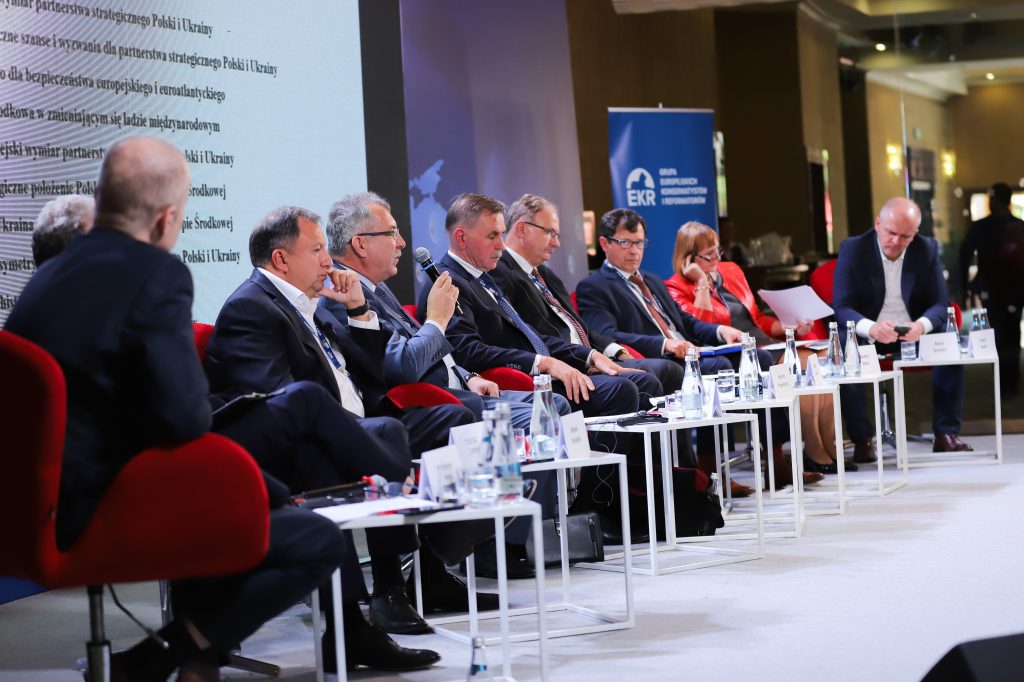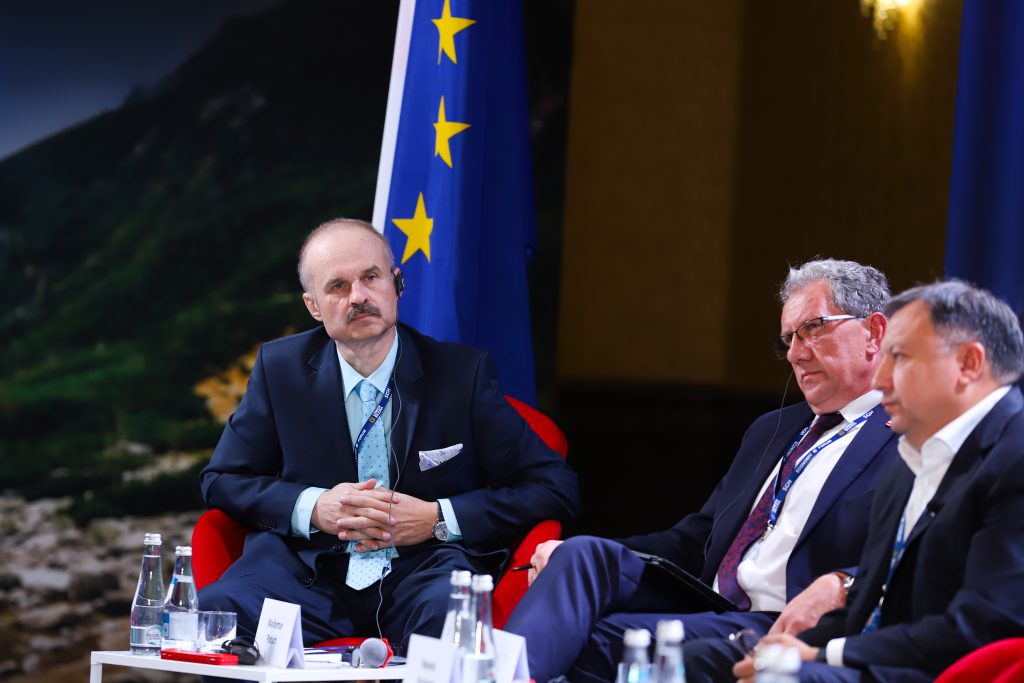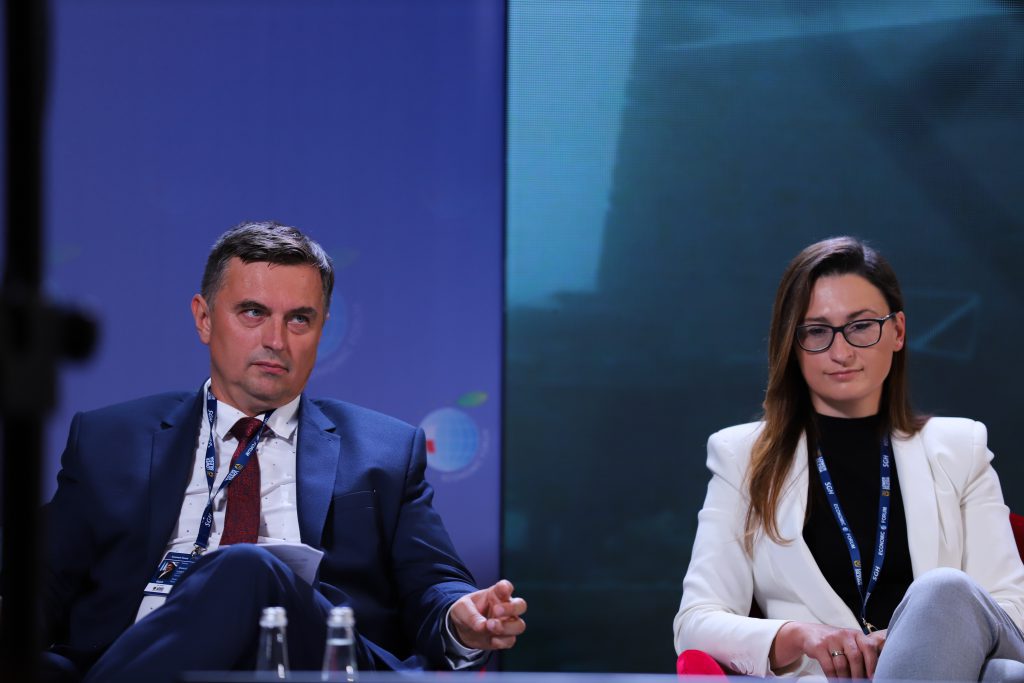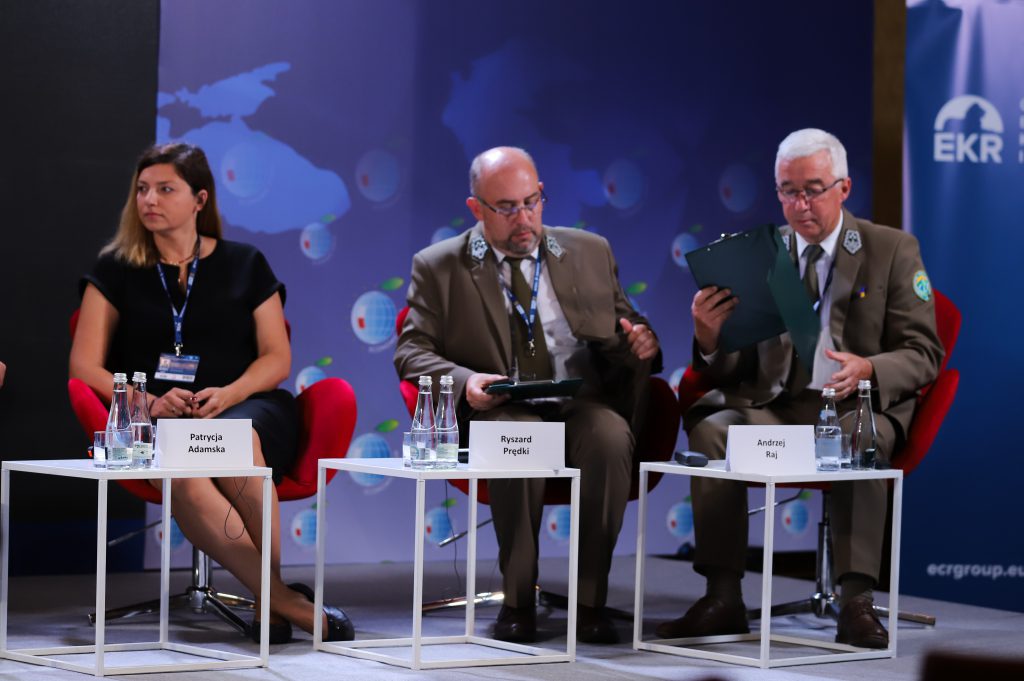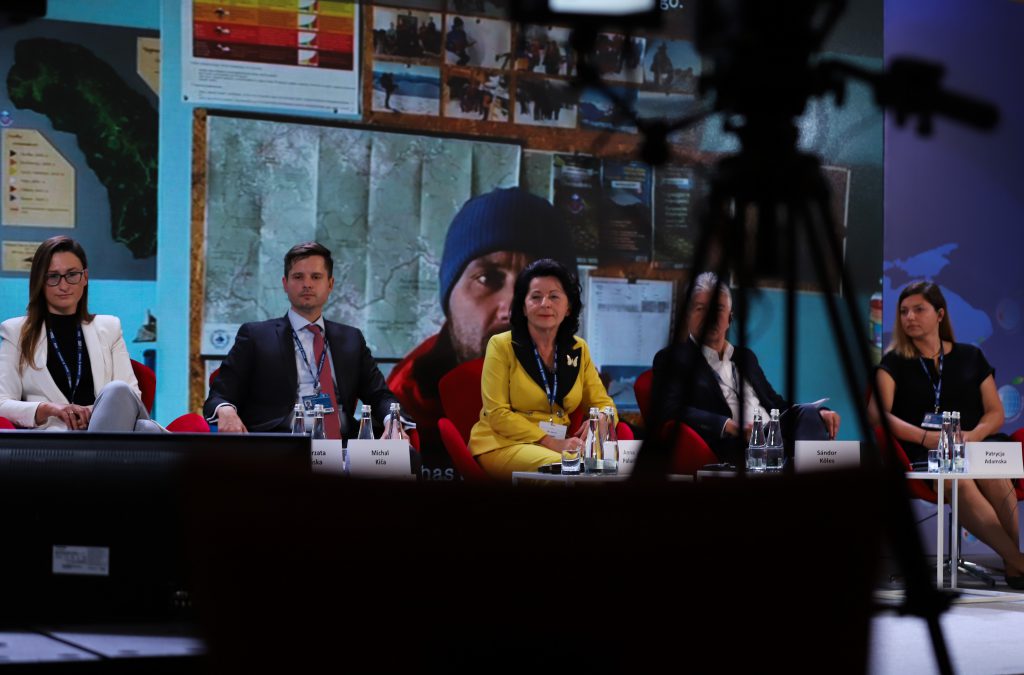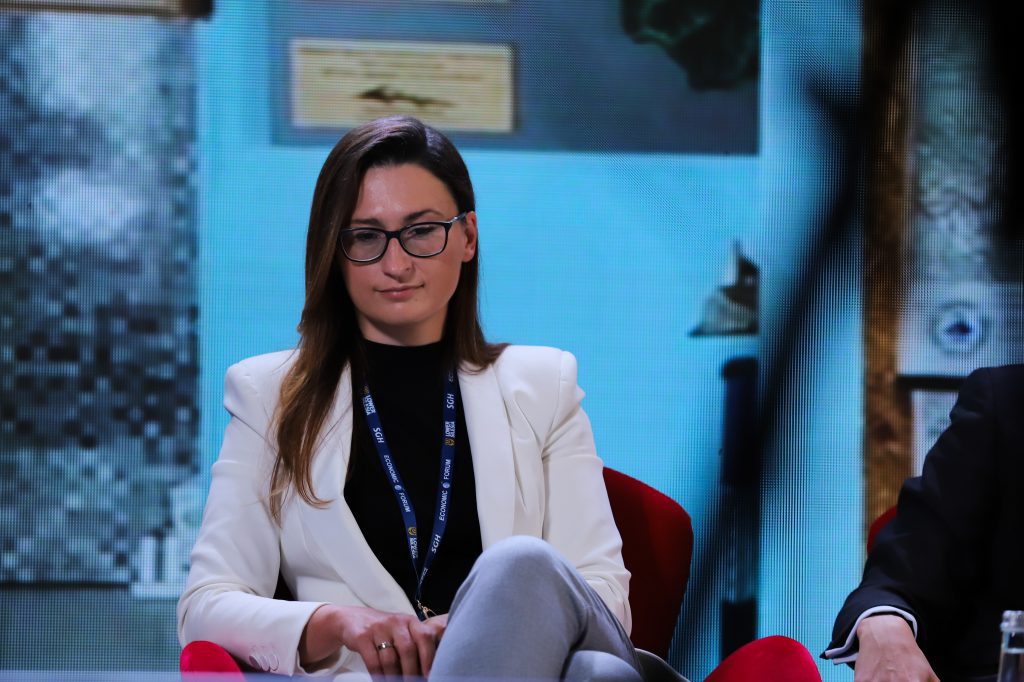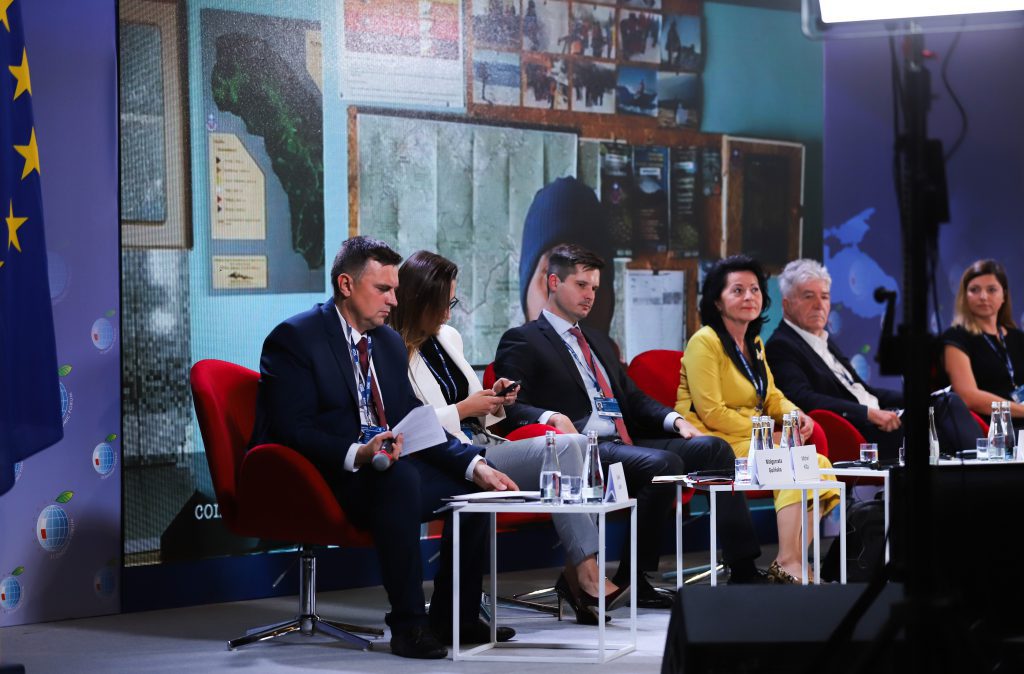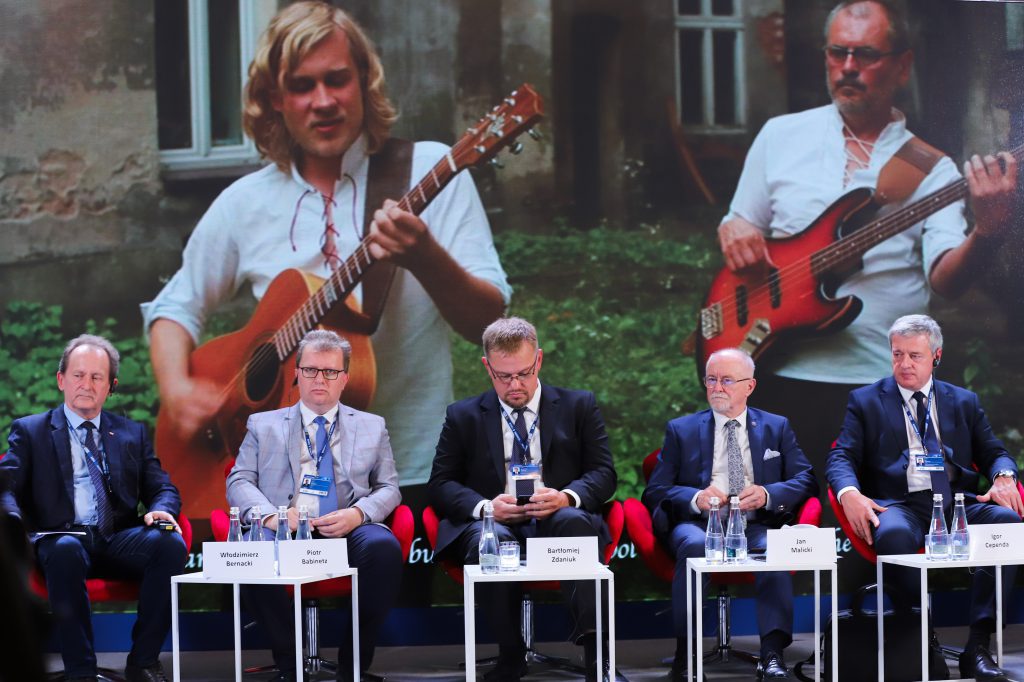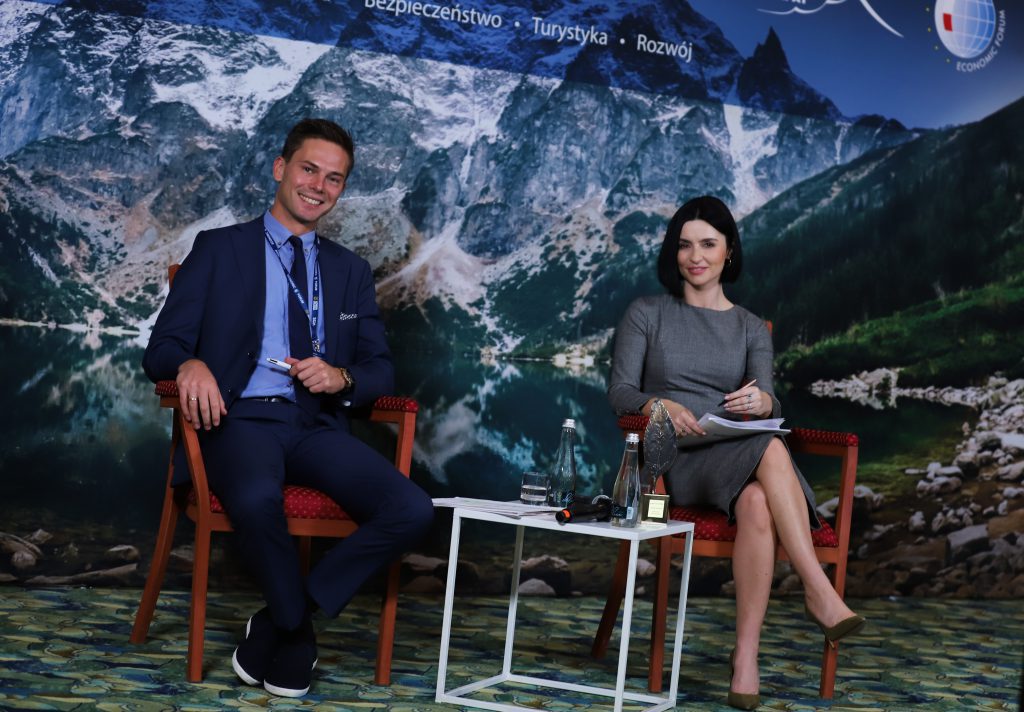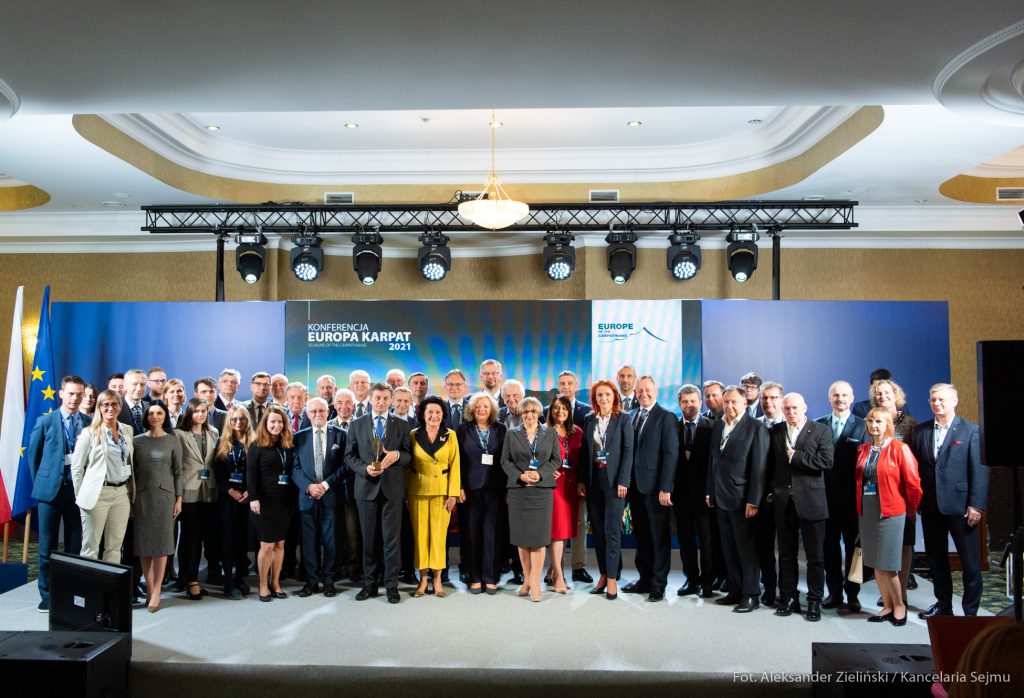Thursday, September 9, was the last day of the 30th anniversary conference "Carpathian Europe". On that day, discussions of experts, politicians, Polish and foreign scientists focused on the Reconstruction Plans for Europe in response to threats and challenges caused by the coronavirus pandemic. The Green Deal and related energy transition were also discussed. The agenda also included the issue of Polish-Ukrainian relations in the context of international relations in Central and Eastern Europe. The Chancellery of the Sejm was the organizer of the three-day conference in Karpacz, while the Wacław Felczak Institute for Polish-Hungarian Cooperation was its partner.
Presentation of the Green Deal for Central Europe
The first panel on Thursday sought answers to the question concerning the impact of the energy transition on, among other things, agricultural production and sought the most effective solutions for Central European countries to effectively implement sustainable development.
- Since 2000, we have been preparing farmers for entry into the EU. The allocation of funds was prepared very efficiently. We managed to maintain small and medium farms, which e.g. in Podkarpacie make up 80 percent. They produce excellent food. Organic farming is a great opportunity. Together with the government, we must prepare agricultural policy in such a way that the young would like to stay in the Polish countryside - said Teresa Pamuła, MP from the Committee on Agriculture and Rural Development.
The EU Commissioner for Agriculture Janusz Wojciechowski emphasized that the Green Deal is a great chance for small and medium farms. - If we take advantage of this chance, in a few or more than ten years we will have a very strong agriculture based on the system of small and medium family farms and we will regain what was lost. Assistance for these farms is crucial for food security - he said.
Waldemar Buda, Secretary of State in the Ministry of Funds and Regional Policy, also spoke in the discussion. - We are building the macro-region Europe of the Carpathians. We have to convince the European Commission that we have common points within this region. The Green Deal should be absolutely leading, we have exactly the same situation as a region. The Green Deal is a gigantic challenge in the sphere of climate, energy, transport. In terms of agriculture, it is a huge opportunity, it is the sector that will be easiest for us to adopt. It is impossible to introduce the Green Deal in Europe excluding agriculture - he emphasized.
In turn, the Minister of Agriculture and Rural Development, Grzegorz Puda, referring to the Green Deal solutions, stated that the Carpathian Europe, Podkarpacie area is a certain indicator. - Poland consists of a lot of small farms and it has passed the time of the pandemic quite peacefully. Large, industrial farms are needed, while the quality of the product is a greater value than its quantity. We have to push hard to develop short supply chains in the short term and make farmers sell their products directly.
- The European Green Deal is a very ambitious challenge. It is important that we do not try to implement these ambitious climate challenges in the EU at the cost of European and Polish farmers. The element of a border tax in terms of carbon footprint is very important. Farmers must be treated fairly and not be restricted in their ability to carry out any activities. The Polish Agricultural Deal contains a number of solutions which take a holistic approach to agriculture and the profitability of agricultural production," said Jarosław Sachajko, deputy chairman of the Agriculture and Rural Development Committee.
Chairman of the Agriculture and Rural Development Committee Robert Telus agreed that the Green Deal is an opportunity for Polish agriculture. - Especially for fragmented agriculture, which accounts for over 80% in Poland. The EU is part of a global trend, where people reach for food of the best quality, and Poland has a very good brand - stressed Mr Telus.
The discussion was moderated by Bogdan Rzonca, Member of the European Parliament.
Reconstruction Plan for Europe. National Reconstruction Plan. Carpathian Strategy
In this session, panelists from Poland and Slovakia discussed the Next Generation EU Fund and National Recovery Plans as a response of EU countries to new threats and challenges posed by the Covid-19 pandemic.
Konrad Szymański, Minister for EU Affairs, spoke about the negotiations and preparation of the new financial perspective at this point of the session. - The negotiations were accompanied by two tensions. One between the investment needs of Central Europe, Carpathian Europe and the objectives of the new EU policies, such as climate policy. The second tension centered around ensuring that the fund and its distribution algorithms were not focused solely on reconstruction. Poland and the countries of the entire region had very good macroeconomic indicators, which threatened that these countries could be left out. We had to explain that this fund is calculated for years and we cannot address only reconstruction in a narrow sense - he said.
Secretary of State at the Ministry of Funds and Regional Policy Małgorzata Jarosińska-Jedynak referred in her speech to the Carpathian Strategy. - This document was finalized in 2018. At this point we have updated it to answer the question of whether the priorities identified in this strategy meet the challenges we face and the investment priorities set by the EU in terms of the Green Deal. The resources within the National Recovery Plan are to be used to meet climate goals and actions. The Carpathians, as part of the stated goal of green Carpathians, fit very well into the actions," she stressed.
- When talking about a new economic model, looking for new paths to growth, one cannot help but notice that these new paths to growth lie in harnessing the potential in new technologies. When we look at the support of low-emission economy for achieving climate goals, we look at the economy as a whole. It is a system of communicating vessels," said Teresa Czerwińska, Vice-President of the European Investment Bank.
Piotr Arak, director of the Polish Economic Institute, reminded that this part of Europe has the largest number of regions, which have less than 50% of the European average in terms of GDP per capita. - This is the poorest part of the EU and requires the greatest support. Today we are in a post-pandemic situation, where economic collapse, negative social effects, this is not our region. The economic catastrophe took place in southern Europe. KPO is a program for Italy, France, Spain. We are not exactly the region that is predisposed to these funds. However, due to economic backwardness, we also still require support and many European countries want to use this period of economic recovery as a springboard - he said.
The Slovak perspective was presented by Jan Hudacky, Honorary Consul of the Republic of Poland in Prešov and former member of the National Council. - We need to rebuild the economy, the economy primarily from the perspective of job creation. This is connected with the social sphere. The pandemic had a negative impact on the development of the Slovak economy. We welcome the EU initiative, the new financial perspective, the Renewal Plan. The vision is for Europe to be greener, more digital, more resilient," he said.
Peter Kremský, Chairman of the Committee on Economic Affairs, also spoke in the discussion. - The Recovery Plan is a huge opportunity for our part of Europe, although it is not money for free. It is a great commitment. Green economy - this is where there is a huge space for improving transport connections. We have a lot to do here. Moreover, there is a chance for environmental investments. The entire renewal plan is an opportunity to improve the competitiveness of Central Europe," emphasized the Slovak politician.
The discussion was moderated by Jerzy Kwieciński, Vice President of the Management Board of Bank Pekao S.A.
"State and perspectives of partnership between Poland and Ukraine".
The starting point for Thursday's panel discussion was a report prepared by the Institute of Political Science and Administration of Maria Curie-Skłodowska University (UMCS), the Central Europe Institute in Lublin, and the T. Shevchenko Kyiv International Relations Institute. The report is an expert analysis of relations between Poland and Ukraine on five levels: 1) common historical memory and cultural heritage; 2) bilateral relations and international security; 3) economic, social and trans-border cooperation; 4) public diplomacy and strategic communication in both countries; 5) Poland-Ukraine relations and international relations in Central and Eastern Europe.
- While preparing this document, we assumed that bilateral relations and the formula of strategic partnership between Poland and Ukraine require taking into account the global international context and the changing international order. The international order after the end of its bipolar form has still not reached the full process of crystallization and is in the process of change. It is important to ask about the change of style and projection of power by the powers that function in the international environment. A disturbing trend in the change of international order is the weakening of multilateralism of international institutions - said Marek Pietraś, Director of the Institute of Political Science and Administration, Maria Curie-Skłodowska University.
Hryhoriy Perepelytsya from the T. Shevchenko Institute for International Relations of the Ukrainian National University stated that assessing the geopolitical situation in which Polish-Ukrainian strategic relations are developing is a very complex task. It is also complex in the context of the Eastern policy of NATO and the EU. Our partnership depends on global trends, on the totality of international relations. Therefore it is difficult to assess the future of our partnership, what strategy should be chosen for our countries, especially in the context of China and Russia - he said.
Mykola Doroshko from the T. Shevchenko Kyiv Institute of International Relations, presenting his opinion on the future of the strategic partnership between Poland and Ukraine, said that the task of scientists is to create a concept for our countries so that this partnership becomes real. - We should fill this partnership with concrete actions. History very often influenced this partnership, and often destroyed it. When it comes to historical policy, we should not seek confrontation. It is important to observe the principle of non-interference in historical politics. It would also be good to draw attention to positive examples of cooperation," he stressed.
Walenty Baluk, in turn, pointed out that in the formal aspect of Polish-Ukrainian relations it must be said that we are indeed dealing with a strategic partnership. However, in the material dimension Poland and Ukraine still have a lot of work to do. The materialization of partnership requires intensive efforts in the area of economic relations. We have a very good treaty basis. Of course, it should be improved. We could think about adopting a memorandum of strategic partnership. The frequency of meetings at the highest level leaves much to be desired. The partnership lacks a certain vision, a new opening - said the Director of the Centre for Eastern Europe at Maria Curie-Skłodowska University.
The Director of the Central Europe Institute in Lublin Beata Surmacz noted that the strategic communication between Poland and Ukraine is not good. - There has to be a clear political decision regarding strategic communication. A measurable common goal, which would be a starting point, has not been defined. A strategic partnership must have a common goal. We also do not have a permanent information base, hence the information about our mutual relations is often very fragmentary," she said.
Paweł Kowal, Vice-Chairman of the Parliamentary Foreign Affairs Committee (ISP PAN) assessed that the report is an attempt to open discussion. - I think that in every such document 20% of it should be devoted to agriculture. Moreover, there should be a clear statement against the nuclear power plant in Królewiec. There is also talk of a defense alliance - he added.
- In the last 30 years, Poland joined NATO, joined the EU. Ukraine has not been able to do that. It is said that Poland's role as an advocate is over. I don't agree with that, Poland is still interested in this. We still need Polish help. Especially Nord Stream 2 shows our common interest," said Mykola Knyazhytsky, Ukrainian co-chairman of the Parliamentary Group for Interparliamentary Contacts with the Republic of Poland.
The discussion was moderated by Professor Waldemar Paruch, Head of the Department of Theory and Methodology of Politics and Administration at Maria Curie-Skłodowska University.
New climate policy in the Carpathians - how to effectively protect the natural heritage in the Carpathians. Potential of national parks
The effectiveness of climate strategies to achieve a common European goal - this issue was debated by the participants in the next point of the conference.
Opening the discussion in this panel, Vice-Chairwoman of the Committee on Environmental Protection, Natural Resources and Forestry Anna Paluch said, she stressed that nature education is one of the statutory tasks of national parks enshrined in the Law on Nature Protection. - It is estimated that about one million people visited the educational units of national parks in 2019. This is a very good transmission belt to social awareness, and all social changes start with awareness, Ms Paluch stressed.
- As we observe and experience climate change, we must answer the question of adaptation, how to prepare for a changing climate. On the other hand, we have a problem with declining groundwater resources, which translates into weakening of tree stands. The second issue is the international expectations. In Poland, we have a lot of experience, which allows us to show that we are one of those countries from which we can learn how to protect nature, biodiversity," said Małgorzata Golińska, Secretary of State, Chief Nature Conservationist.
Michal Kiča, State Secretary at the Ministry of Environment of the Slovak Republic presented the situation of Slovakia in this matter. - Slovakia is going through a clear process of transformation when it comes to the attitude towards national parks. We are also dealing with the institutional problem. The territories of the parks belong to the state. We want to ensure that the national park is a strong regional player in managing this area - he pointed out.
The Hungarian perspective was presented by Sándor Köles, President of the Carpathian Foundation. - We are all members of the European Green Deal. The ambitions of Hungarians are very similar. We have several priority areas: waste management, protection of natural resources, water management, clean air, reduction of chemical use in agriculture. Everything requires cooperation on different levels, EU, regional. We can better combat the effects of climate change - he said.
- It is not just about restoring ecosystems that are already in bad shape, but fighting for those that are still in good condition. This is a key 10-year period for preserving plant and animal species that we may lose irretrievably,' said Patrycja Adamska, coordinator of the Carpathians Are Connecting project.
The director of Bieszczady National Park Ryszard Prędki also spoke. - Mountain national parks are very much connected with climate changes. They protect nature in its most natural state. Bieszczady National Park is very unique, it protects over 20 thousand hectares of forests and this is just a conservative protection - he pointed out.
The last panelist in this section was Andrzej Raj, director of the Karkonosze Park. - Areas of mountain national parks are irreplaceable laboratories, where we can observe in what direction these changes take place. This is a value that we should use not only in scientific but also in economic sense - he emphasized.
The discussion was led by the Vice President of the Association of Carpathian Euroregion Dawid Lasek.
Central Europe - Heritage, People and Future
The discussion in this panel was inaugurated by a speech by Włodzimierz Bernacki, Secretary of State, Government Plenipotentiary for Monitoring the Implementation of Higher Education and Science Reform. - When we talk about the nations of Central and Eastern Europe we should first of all look at it from the perspective of facts. This knowledge is only marginally present in Western European literature. Sensitivity in thinking about the nation, respect for history, for the national language - these are some of the components common to our part of the world - he said.
- An important factor to talk about in the context of Central Europe is the outstanding people who have come from there. Some well-known, others forgotten. It is said that about 100 Nobel Prize winners come from Central Europe. There are also such great people as Stefan Banach. According to various calculations, he is the most often quoted mathematician in all mathematical works in the world. Also Kazimierz Wierzyński, a great Polish poet and advocate of cooperation between the nations of Central Europe. Marian Wieleżyński, a forgotten engineer, or Karol Sidor from Slovakia, a leader of pro-Polish circles in Slovakia," said the chairman of the Parliamentary Commission for Culture and Media, Piotr Babinetz.
- At work in a certain part of the post-Soviet area there is a problem of attitude to the past, heritage. There is a need for reflection on the knowledge of history, as well as popularization, narration of the phenomena that took place. We can see that there is progress in research, but does it translate into knowledge - asked Bartłomiej Zdaniuk, Polish ambassador to Moldova.
Jan Malicki, director of the East European Studies at the University of Warsaw, shared his experience as an academic. - A number of panels dealt with education and foreign contacts. If we want to think about building some kind of unity or bringing people together in our part of Europe, then scholarships and academic exchanges are the best way of all. Poland, which is by no means the richest country in the EU, has for decades been spending colossal amounts of money on accepting scholarship recipients from the entire former Soviet Union. Most of these people have been expelled from universities or politically persecuted. Poland does this because it is in the interest of the people from those countries, but also in the interest of Poland. The 20th century shows that if you do not influence the education and awareness of young elites, the results are negative - he said.
Igor Cependa reminded that together with the University of Warsaw the Collegium Carpaticum was created, which includes universities of the Visegrad Group, Romania and Ukraine. We want Western, Central, and Eastern Europe to see a model that combines values, intellect, and produces what Europe needs today," emphasized the rector of the Ukrainian Carpathian National University.
Markijan Malsky of Lviv University pointed out that the Carpathian Europe project is a great event in the field of geopolitics and our common heritage. - Every year we repeat that the concept of Carpathian Europe is not only a cultural and economic concept. More and more often we should talk about institutionalization of our project - stated the former Ambassador of Ukraine in Poland.
The Slovak perspective was presented by Pavol Macala of the Scientific Association for Personalism. - The way we live in Central Europe is decadent. The contemporary model of civilization is not correct. Let us search for the truth. This is the challenge of Central Europe - he said.
The final vote in the discussion belonged to Janusz Kapusta, draughtsman, painter, stage designer and inventor of the eleven-sided solid K-DRON. This panel was moderated by Matyas Zrno (Občanský institute, Czech Republic).
The 30th conference of 'The Europe of the Carpathians' was summarized by the winner of the special prize of this year's Economic Forum in Karpacz, the chairman of the Parliamentary Foreign Affairs Committee Marek Kuchciński. - It is worth noting the great interest, support and co-creation by friends from various countries of Central Europe, politicians, publicists, journalists, people of culture, economists. Creating a very good atmosphere for discussion and cooperation. In this perspective of twenty-some years, I do not recall any defeatist speech. We paid attention to problems and challenges, but we looked to the future, we saw the goal. Cooperation, collaboration, throwing slogans that are later realized. That is also how it was during this year's edition - noted the former Speaker of the Sejm.
Conference rebroadcast: YouTube
text: Sejm Information Center
photo: Marta Olejnik, Aleksander Zieliński, Łukasz Błasikiewicz
